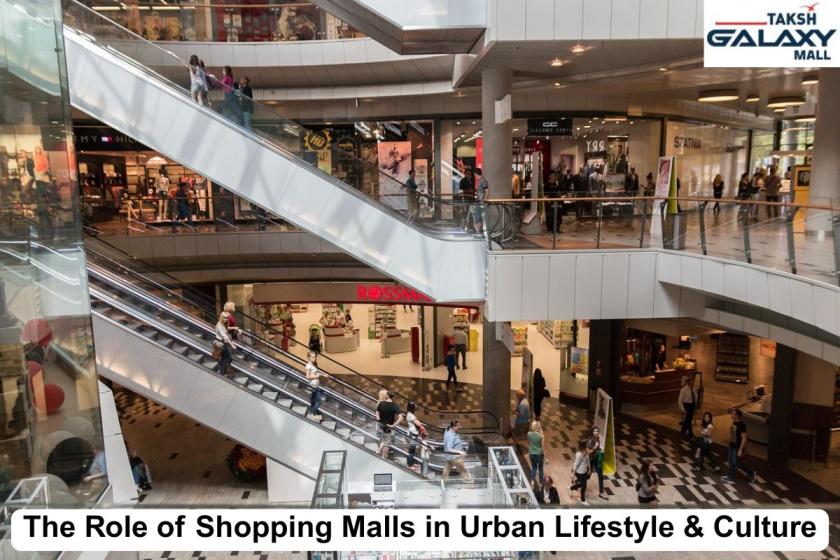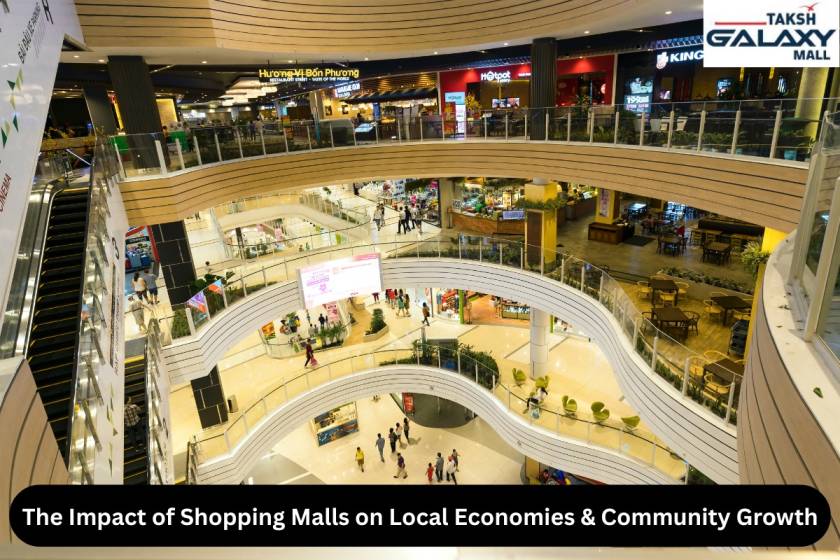Table of Contents
Introduction
Shopping malls form a part of urban life today. These malls are not somewhere to visit and buy things only. Shopping malls are becoming social, cultural, and entertainment centers. People go to malls to shop, eat, relax, and spend time. This blog discusses the contribution of shopping malls to urban lifestyle and culture. It highlights how malls influence social behavior, the economy, and family fun. Therefore, it speaks of some popular destinations such as the Taksh Galaxy Mall in Vadodara, which is a perfect representation of a contemporary mall. Having an understanding of this function helps us to see the significance of malls even today.
Evolution of shopping malls in urban areas
Shopping malls initially emerged to serve increasing urban demands. As cities grew, individuals required easy access to shops. Malls bunched several stores together under one facility. This concept expanded quickly in the late 20th century. Malls continued to develop over time to incorporate entertainment and restaurants. Now, malls are total lifestyle centers.
Malls replaced most traditional markets in the majority of cities. They provided a cleaner, safer, and more comfortable place to shop. Also, malls had air conditioning, parking, and places for rest. All of these things drew families and people in general.
For example, the best shopping mall in Vadodara provides a modern-day shopping experience along with cultural events and food courts. This mall illustrates how malls have merged shopping and lifestyle nowadays.
Shopping malls as social hubs
Malls became social hotspots. Individuals do not visit in order to purchase products. They come to meet friends, hang around, and commemorate events. Social interaction is promoted by the atmosphere in a mall. In addition, malls feature entertainment in the form of concerts, exhibitions, and festivals. These bring people together.
Families take advantage of malls as secure and fun areas to spend leisure time. Youth group members meet here to socialize and check out trends. Additionally, malls offer areas for kids to play and learn. This role as a social area is significant in congested cities,where open space could be scarce.
In cities like Vadodara, malls like Taksh Galaxy Mall in Vadodara are believed to merge leading points. The malls have various activities that keep the shoppers engaged for hours together.
Economic impact of shopping malls
Shopping centers make a huge contribution to the economy in terms of local input. They provide employment opportunities in management, retailing, housekeeping, and security. Additionally, they offer an opportunity for small businesses to thrive, and they succeed. This makes urban economies diversified and expanded.
Malls have the ability to draw visitors and customers from surrounding towns. This boosts business within malls as well as in the neighboring towns. Additionally, malls contribute to promoting the sale of brands and local craftspeople.
Here is a summary of the economic advantages of malls:
| Economic Benefits | Description |
| Job Creation | Employment in retail and service sectors |
| Business Growth | Platforms for local and international brands |
| Tourism Boost | Attract shoppers from other regions |
| Urban Development | Increase in infrastructure and services |
This table highlights why malls are vital for urban economies.
Influence on urban lifestyle
Malls have transformed the way people live in cities. Malls promote a consumerist lifestyle as they facilitate shopping to become easier and more enjoyable. Individuals spend holidays and weekends at malls, relaxing while shopping.
Moreover, malls also dictate fashion, food, and entertainment. Malls bring global brands and fashions to local consumers. Furthermore, malls provide customers with a variety of products under a single roof. It saves time and effort.
Urban residents enjoy the ease and security malls provide. When the weather is harsh in cities, malls become a relief. Therefore, they promote individuals to adopt healthier lives by offering gyms, health centers, and healthy food.
Malls like the best malls for family fun in Vadodara offer such facilities. Families can shop, eat, and enjoy recreational activities together.
Shopping malls and family entertainment
Malls have become family centers. They have something for each age group. Parents can shop while children can play in play zones or watch movies at the movies. This makes malls ideal places for family outings.
The majority of malls have activities for children. These range from reading stories and puppet shows to festive events. Also, food courts offer various foods, serving various tastes.
However, some of the malls even have amusement parks and game zones. These marvels keep families entertained for hours. Malls also have safe and clean environments, which make parents feel secure.
For example, the best family entertainment malls in Vadodara have a great mix of entertainment and shopping. This mix makes malls so attractive to families.
The cultural significance of malls
Malls represent urban culture and life. They are where there is tradition and modernity combined. Malls typically have music performances, art exhibitions, and cultural festivals. They add to local culture and heritage.
The malls also introduce people to world cultures through brands and food from around the globe. This blend contributes to the building of cosmopolitan urban societies.
Additionally, shopping malls also influence social practices and fashion. People adopt new practices and fashions seen at shopping malls. Malls are also a platform for cultural exchange and networking.
Furthermore, shopping malls like the Taksh Galaxy Mall in Vadodara also host local festivals on a regular basis. This fosters social bonding and cultural identity.
Challenges faced by shopping malls
Even with their popularity, malls are faced with various problems. Foot traffic gets eroded by online shopping. It is easier and less expensive for most people to shop at home.
Moreover, it is costly to have big malls open. Security, cleaning, and maintenance are very costly. Malls also need to come up with new ideas every time they want to attract visitors.
Urban planning issues also haunt malls. Traffic and parking problems might deter shoppers. Finally, malls must balance commercialization and cultural sensitivity.
Malls like the top shopping mall in Vadodara overcome the challenges by improving services. Experience and entertainment make customers repeat their visits.
Future trends in urban shopping malls
The urban shopping mall future is bright but in flux. Shopping malls will be experiential, not so much about shopping. Virtual and augmented reality, as well as interactive screens, will enhance visitor engagement.
Sustainability will be an issue as well. Malls will adopt green architecture and energy-saving technologies. This fits with growing environmental awareness.
Besides that, shopping malls will have technology to make them easier to use. Smart parking, digital payment, and tailored shopping will make customers happy.
Family entertainment also will grow with more indoor parks, cinemas, and function halls. So, malls will remain key urban way-of-life destinations.
Conclusion
Shopping malls are part and parcel of city culture and life. Malls are social, economic, and cultural centers. Malls provide convenience, fun, and socialization. Malls prefer families with secure and fun areas.
In a city like Vadodara, shopping malls like the Taksh Galaxy Mall in Vadodara establish benchmarks for contemporary retail and entertainment. Moreover, the malls add shopping to family enjoyment and cultural outings. Malls keep changing and adapting to urban requirements, even in the face of challenges. Overall, shopping malls continue to be a part of urban life, determining the way we shop, socialize, and spend leisure time.





